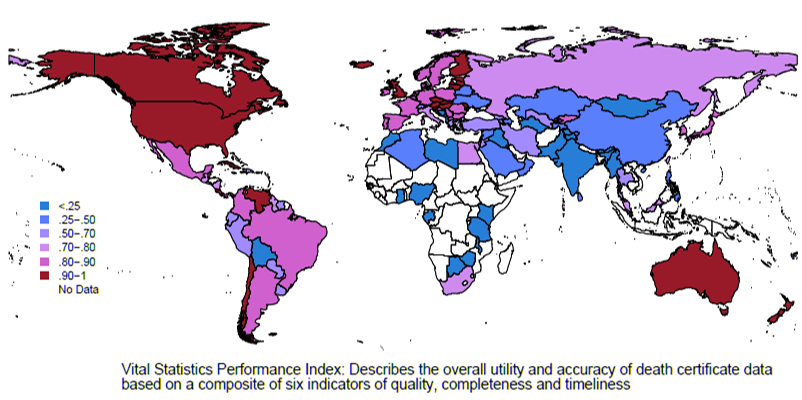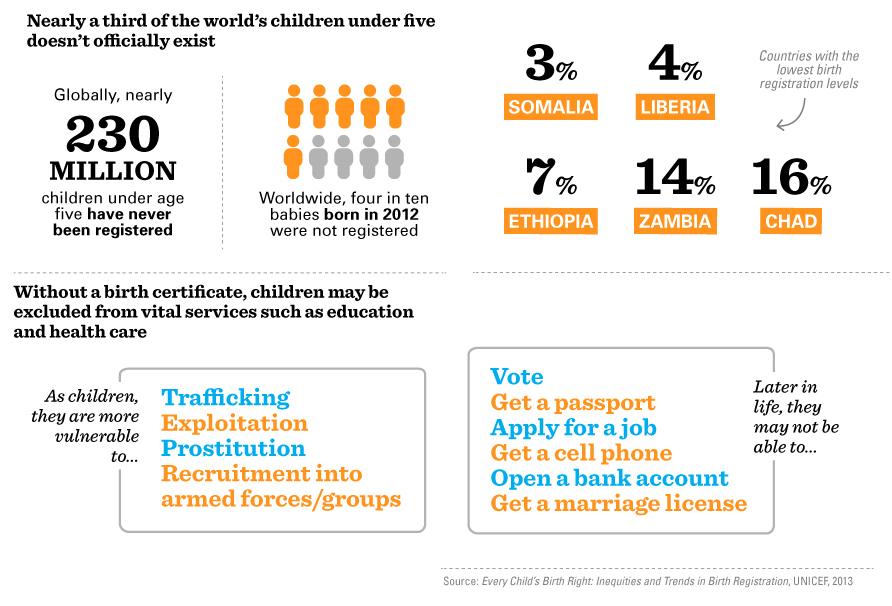Investing in civil registration and vital statistics systems for improved human rights and enhanced data
Do you know how difficult life would be if you didn’t have a birth certificate? This is the very first legal identifying document that individuals possess shortly after birth in many developed countries, containing vital information about them such as full name, date and place of your birth. More than 99% of births occurring in the United States of America are registered, providing proof of citizenship from birth and enabling subsequent access to other services including registering for school, signing up for sports, and obtaining a passport and a driver’s license.
In most developed countries that have well-functioning civil registration and vital statistics (CRVS) systems, obtaining documents like birth and death certificates is a fairly easy process. However, the United Nations Children Fund (UNICEF) estimates that less than half of children under five in sub-Saharan Africa have their births registered with a civil registration authority, and the latest World Health Statistics Report shows that only four countries in Africa have information on the quality and completeness of cause-of-death data. Moreover, in most of these countries, CRVS systems are paper-based and therefore records are sometimes misplaced or lost. Developing and maintaining strong CRVS systems is critical for registering and issuing certificates for births and deaths; and compiling and disseminating vital statistics, including cause-of-death medical certificates.
Availability of CRVS Data Across Countries
Concerted efforts are therefore required in Africa to strengthen CRVS systems, including prioritizing areas with the potential to accelerate results towards ensuring that all people have a legal identity to help in protecting their civil and human rights. This includes supporting innovative financing mechanisms such as the Global Financing Facility (GFF) to strengthen the capacities required at different levels of the CRVS system to register births and deaths; record causes of death; and digitize records. Through these, vital statistics can be generated to monitor progress towards achieving the Sustainable Development Goals.

Some African countries are already making strides to improve different areas of their CRVS systems, all with the goal of achieving universal birth and death registration, including the recording of causes of death; providing data for results monitoring; and for secure storage of data and easy retrieval of records. With financial support from the International Development Association (IDA) and the GFF Trust Fund, Cameroon, Ethiopia, Liberia, and Uganda are set to improve their CRVS systems through projects designed to target specific areas.
Cameroon: Performance-Based Financing in CRVS
Cameroon is one of the few countries in Africa where birth registration has declined over time, reaching around two-thirds in 2014. To accelerate birth registration, Cameroon has adopted performance-based financing (PBF) indicators at the community, health facility and district levels to ensure that registrations are made for each delivery. Additionally, the project covers training and capacity-building for the PBF program, including components of birth and death registration and maternal death audits. The project also supports the country to increase the number of registration centers and registration officials.
Moving from paper-based to electronic registration in Ethiopia and Liberia
In Ethiopia, the focus is on developing an electronic civil registration system. The project supports technical assistance, capacity building, and information and communication technology equipment to move from manual registration towards a more technologically advanced and efficient electronic system. The country will also undertake activities to support advocacy and raise public awareness about the importance of CRVS systems, including the distribution of information, education, and communication materials.
Liberia also concentrates on moving towards harmonized registration systems and processes, particularly seeking to address the mixed use of paper-based and digitized registration with very limited connectivity. The project in Liberia covers the development and implementation of an integrated civil registration management information system that will include all births and deaths and causes of death.
Improving death registration in Uganda
With death registration estimated at less than 1 percent, Uganda is prioritizing investments to support the development of death registration protocols and training manuals; curricula on cause of death certification and coding using the International Classification of Diseases, 10th revision (ICD-10); and norms and standards for cause-of-death reporting in health facilities and in communities. Training of clinical staff and maternal and perinatal death audit committees on cause-of-death reporting using ICD-10 will also be provided, as well as support for designing a death registration module within the existing birth registration system and for developing a customized district health information system module for cause-of-death certification and ICD-10 coding.
As African ministers responsible for civil registration gather in Nouakchott, Mauritania, to review progress and make plans to accelerate improvements in CRVS systems on the continent, an opportunity emerges to advocate for more investments in CRVS. Through allocating more domestic resources towards strengthening CRVS and engaging the private sector and coordinated support from development partners, countries can drive the change towards universal birth and death registration.
For more information, read the GFF's CRVS Fact Sheet.
Photo: UNICEF